The LBJ Presidential Library hosted the commemoration of the 1964 Civil Rights Act on Monday afternoon. The event brought together guests as well as local and national dignitaries. President Joe Biden made his way to Austin for the first time since 2021 to deliver the keynote address.
Originally set to take place on July 15, the event was rescheduled to Monday due to security concerns after the assassination attempt on former president Donald Trump two days before Biden was scheduled to speak in Austin.
The program featured performances by the Huston-Tillotson University choir and Grammy nominated singer-songwriter Ruthie Foster. Actor Bryan Cranston recited an excerpt from the remarks Lyndon B. Johnson made to the nation prior to signing the Civil Rights Act. Andrew Young, a civil rights activist who worked alongside Dr. Martin Luther King Jr. and a U.N. Ambassador during the presidency of Jimmy Carter, introduced President Joe Biden. The event attracted legislators, press and guests from all over the country and was a chance for Biden to address the past, the present and the future—all in one speech.
The 1964 Civil Rights Act remains one of the most important pieces of legislation in American history. Prior to its passage, Jim Crow Laws enforced and legalized racial segregation across the South. These laws had been in place since roughly the late 19th century, following post-Civil War Reconstruction. Segregation was reinforced by community policies like Austin’s 1928 Master Plan, which pushed communities of color, primarily African Americans, to the east side of Austin.
The 1964 Civil Rights Act and 1965 Voting Rights Act were critical in shifting these dynamics in our nation. But while these laws achieved significant reform, the speakers at Monday’s program said repeatedly that the challenge to improve civil rights persists. Biden asserted in his keynote address that the recently proposed conservative presidential transition project, Project 2025, “calls for aggressively attacking diversity, equity and inclusion all across all aspects of American life.” During the event, speakers like Ambassador Andrew Young reiterated that each generation has to protect existing rights and work together toward even greater justice and equity for all.
The program itself took on historic meaning, because it was President Joe Biden’s first public appearance since withdrawing from the presidential race on July 21 and endorsing Vice President Kamala Harris. Many observers drew a parallel between his decision to leave the 2024 presidential race and President Johnson’s decision to do the same in 1968. Both decisions included a call to action to the next generation of Americans to finish the work started by generations who have come before to get ever closer to achieving the founding principles of our nation.
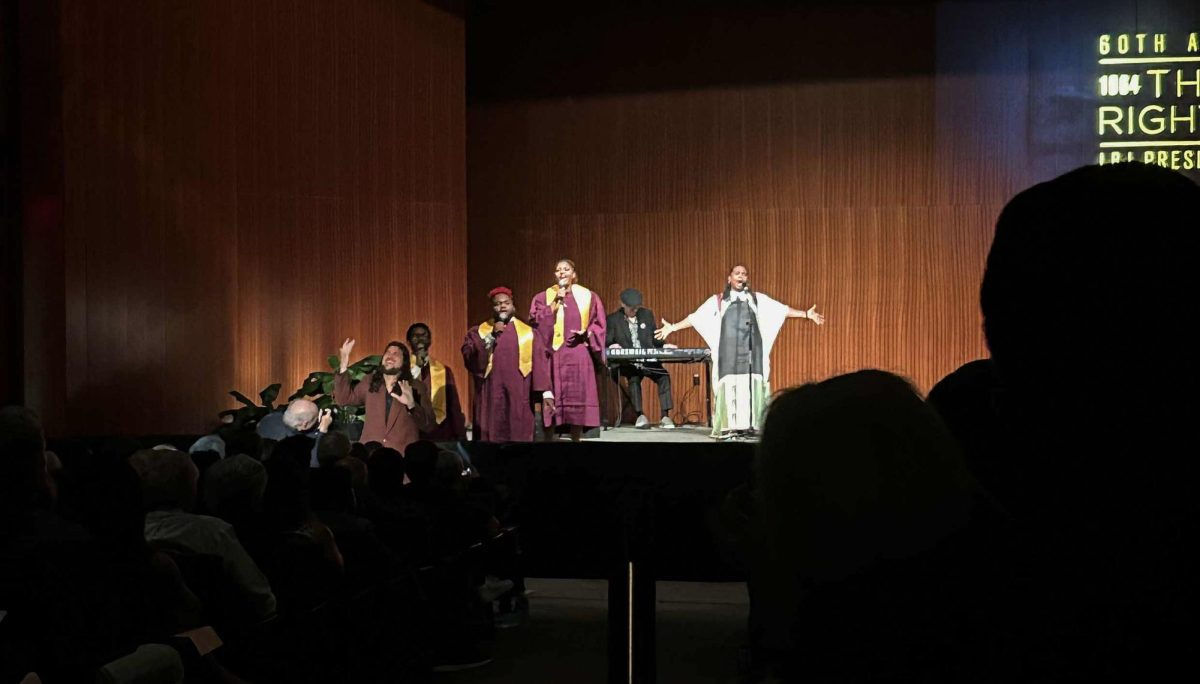
“It was absolutely spectacular,” she said. “It was an honor that we were asked to participate … as an HBCU and the first institution of higher learning in the city of Austin. It means a lot.”
Wallace felt that the event was a success all around and an exceptional way to commemorate the 60th anniversary of the Civil Rights Act.
“I loved the event,” she said.“ From the opening with the song, of course, with the Huston-Tillotson choir, to the remarks from President Joe Biden, it was a great culmination of really honoring this spectacular achievement.” Photo and caption by Lillian Gray.
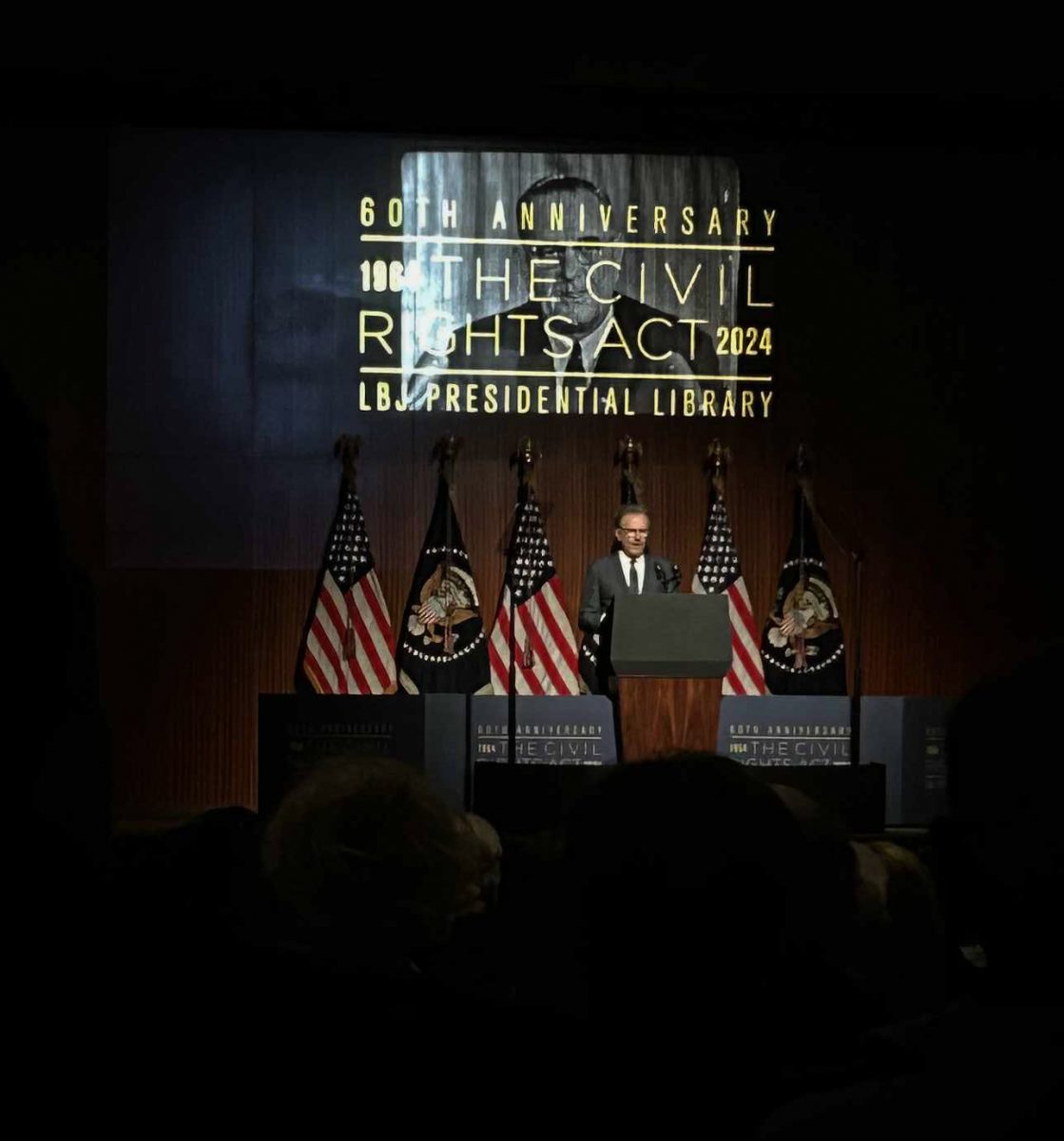
Following the musical performance of “Feels Like Freedom,” sung by the Huston-Tillotson University choir and singer-songwriter Ruthie Foster, actor Bryan Cranston took the stage. Cranston, who portrayed Lyndon B. Johnson in the 2016 film All The Way, read an excerpt from Lyndon B. Johnson’s 1964 speech during the signing of the Civil Rights Act. Although LBJ spoke these words to the nation 60 years ago, much of what Cranston recited is still relevant today and connected with the themes of Biden’s keynote speech, which called for the nation to continue to fight for freedom for every American.
“Now our generation of Americans has been called on to continue the unending search for justice within our borders,” Cranston recited from President Johnson’s 1964 remarks. “We believe that all men are created equal yet many are denied equal treatment. We believe that all men have certain unalienable rights yet many Americans do not enjoy those rights. We believe that all men are entitled to the blessings of liberty yet millions are being deprived of those blessings, not because of their own failures, but because of the color of their skin.”
The 1964 Civil Rights Act was one of the most important pieces of legislation following the Reconstruction period, successfully ending the Jim Crow Laws and prohibiting discrimination in many areas of society. Many of the freedoms that Black Americans enjoy as an integral part of their daily lives were nonexistent just 60 years ago. Cranston powerfully delivered one of the most powerful lines of President Johnson’s historic speech.
“We can understand without rancor or hatred how this all happened but it cannot continue. Our Constitution, the foundation of our republic forbids it, the principles of our freedom forbid it, morality forbids it and the law I will sign tonight forbids it. Its purpose is to promote a more abiding commitment to freedom, a more constant pursuit of justice and a deeper respect for human dignity.” Photo and caption by Lillian Gray.
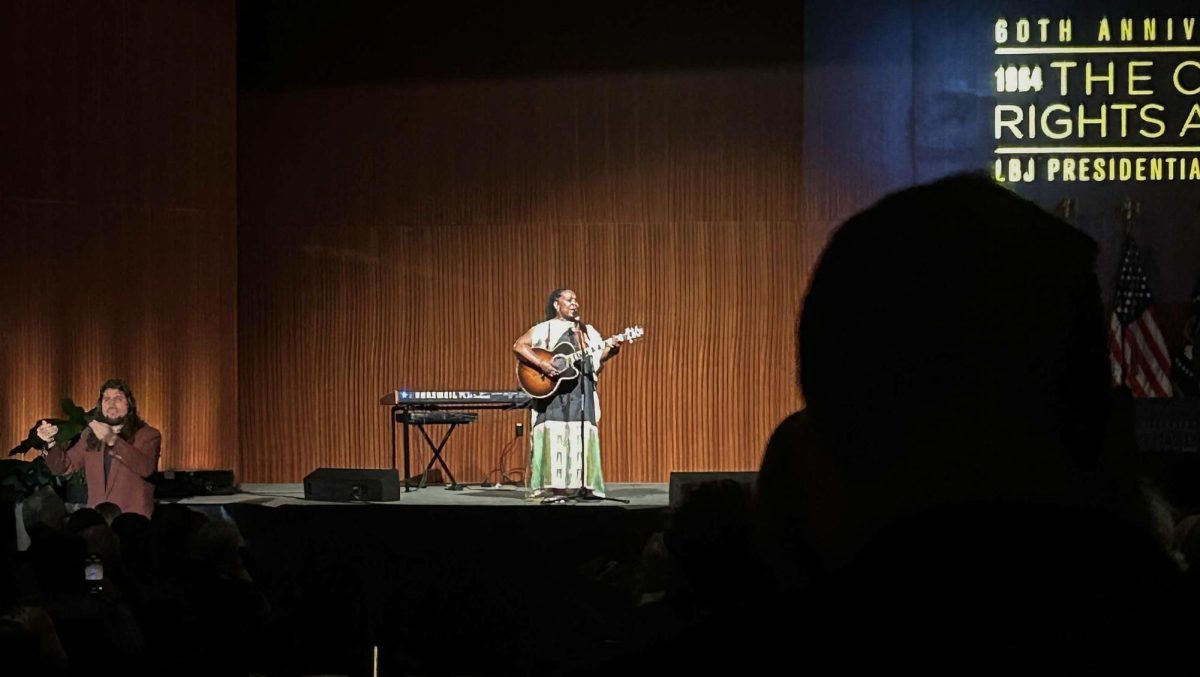
Five-time Grammy-nominated singer-songwriter Ruthie Foster performed at the 60th anniversary of the Civil Rights Act. Joined by the Huston-Tillotson University choir, she opened the event with a moving rendition of the song “Feels Like Freedom.” Then, following actor Bryan Cranston’s reading of an excerpt from Lyndon B. Johnson’s 1964 Civil Rights Act signing day speech, Foster did a solo performance of “If I Had A Hammer.” In a post shared on Instagram, Foster expressed her gratitude for being included in such an historic event.
“I had the honor of singing at the 60th anniversary of the Civil Rights Act at @lbjlibrary yesterday. Thank you for having me perform ‘Feels Like Freedom’ with the @hustontillotsonuniversity Choir and ‘If I had A Hammer!’”
A Texas native and Austin resident, Foster helped introduce the event in what President and CEO of the LBJ Foundation, Mark Updegrove, called a “grand manner” that set the tone for the ceremony. Photo and caption by Lillian Gray.
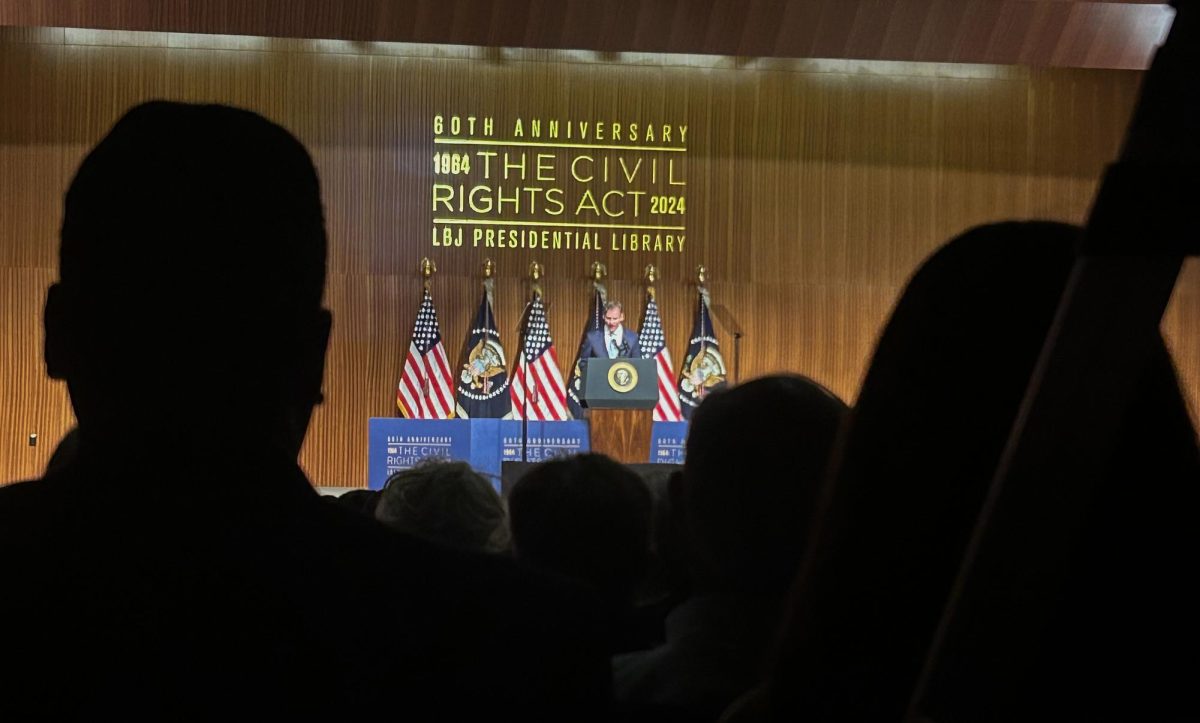
After Ruthie Foster performed “If I Had a Hammer,” there was a roughly 20-minute break. During this time, the presidential seal was placed on the podium, awaiting President Joe Biden’s keynote address, and distinguished guests who had arrived at the LBJ Presidential Library with President Biden made their way to their seats. Once preparations were complete, President and CEO of the LBJ Foundation, Mark Updegrove, spoke about the LBJ Presidential Library’s history of commemorating the 1964 Civil Rights Act, as well as the legacy that Lyndon B. Johnson left behind.
“The walls of the LBJ Auditorium once again echo with history and voices from the past,” he said. “Eight years after speaking to Americans in advance of signing the Civil Rights Act, which made real our nation’s most sacred promise of ‘all men are created equal,’ Lyndon Johnson stood on this stage as a former president and delivered his last public remarks.”
Updegrove went on to describe that event and President Johnson’s call to action on that day.
“Battling a weak heart, President Johnson defied doctors’ orders to give a keynote address at a Civil Rights symposium he had convened to talk about the state of race in America,” Updegrove said. “He had something to say, and he was determined to say it: ‘Until we overcome unequal history,’ he declared, ‘we can’t overcome unequal opportunity. There is still work to be done, so let’s be on with it,’” Updegrove said.
Ultimately, President Johnson was not able to carry the work forward himself, passing away a little over a month later, on Jan. 22, 1973, at the age of 64. But, as Updegrove described, others picked up where he left off and continue to honor his accomplishments.
“Even now, half a century later, we hear his call,” he said. “Four other presidents, including the first African American president, have graced this stage to recognize the advancement of civil rights, and to talk about the work still to be done.” Photo and caption by Lillian Gray.
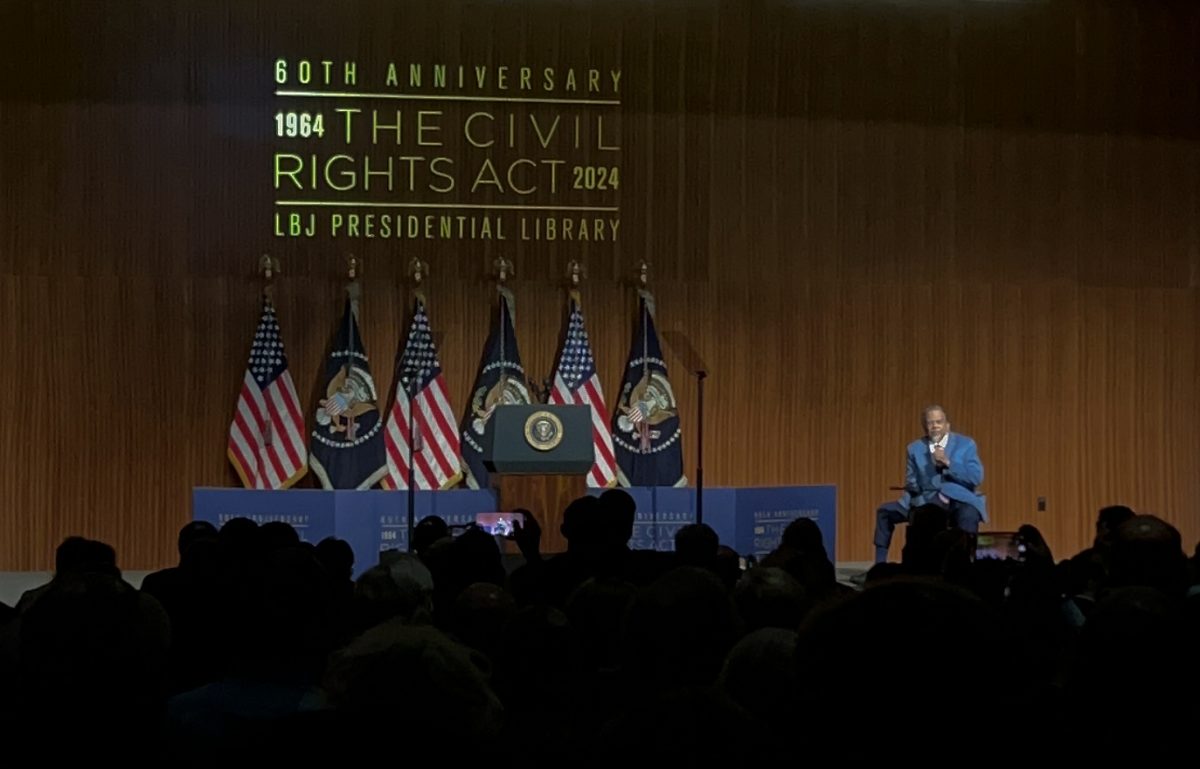
Activist and civil rights leader, former U.N. Ambassador Andrew Young, introduced Biden to the stage. Young played an important role during the Civil Rights Movement as he worked alongside Dr. Martin Luther King Jr. He was a prominent voice in the movement that helped secure the passage of the 1964 Civil Rights Act. Now 92 years old, he praised President Biden’s leadership and service.
“For the last 50 years he has devoted himself to fulfilling the dreams of the American people,” he said. “Few people have been able to thrive and succeed in the midst of so much pressure and tension and responsibility as Joe Biden.”
Given that this was President Joe Biden’s first public speech since he stepped out of the presidential race on July 21, Young highlighted Biden’s choice to put country before self.
“Ray Charles said it best, when he started his recording of ‘America the Beautiful’ with the third verse of that song. And it said, ‘Oh beautiful for heroes proved in liberating strife; who more than self their country loved; and mercy more than life; America, America may God thy gold refine; till all success be nobleness and every gain devine,’” he continued. “I think that is a promise fulfilled in the life of the 46th President of the United States, Joseph Biden.”
After Young’s introduction, Biden walked onto the stage, grasped his hand and leaned in to speak to him. Biden then made his way to the podium, as the crowd erupted with applause. When Biden had a chance to speak, he began by expressing gratitude toward Young.
“Ambassador, thanks for that introduction and above all for your friendship over the years,” Biden said. “There’s only one word that comes to mind every time I think of Andy Young: the word is integrity, absolute integrity.” Photo and caption by Lillian Gray.
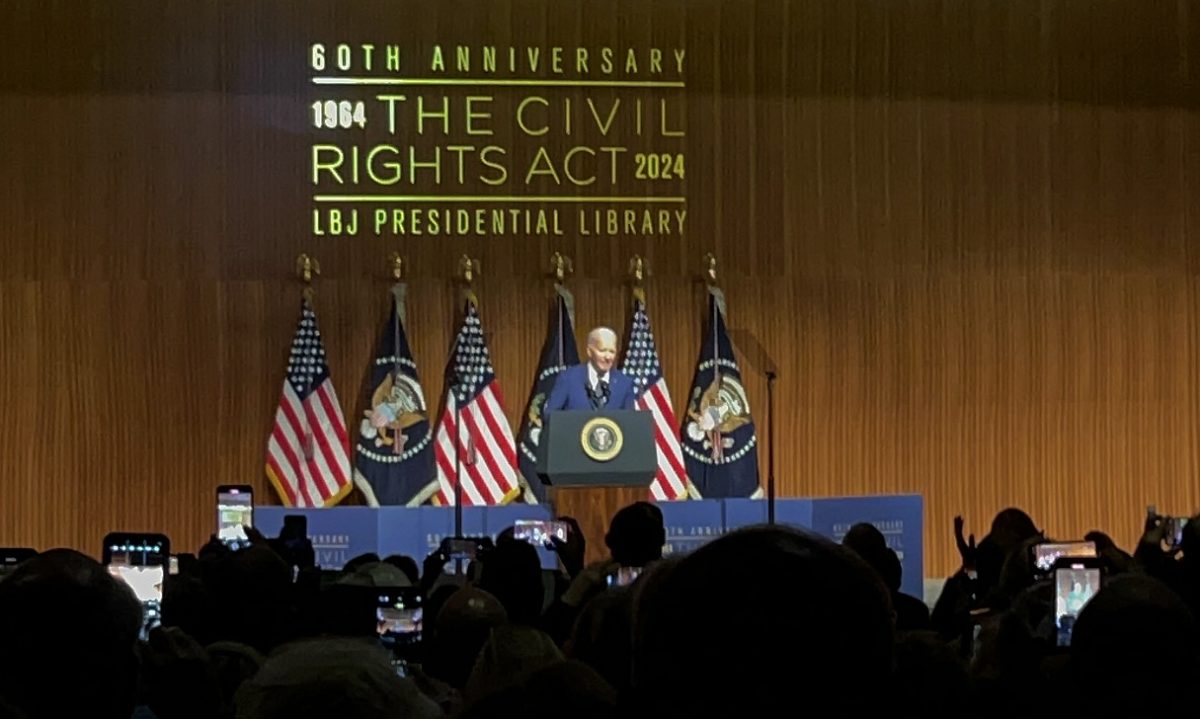
With the introductory speeches completed, President Joe Biden took the stage, beginning his speech with a commemoration of not only the Civil Rights Act, but of Lyndon Johnson’s contributions and ideology both during his presidency and beyond. Biden spoke of his reverence for Johnson as a student in the 1960s and later a politician himself, recalling memories of his leadership following the assassination of President Kennedy in 1963.
“I always admired President Johnson for his public service,” Biden said. “Whether it was [as] a school teacher in Southern Texas, a master of the United States Senate [or] a historic vice president and president. His philosophy was simple: in a Great Society, no one should be left behind.”
Biden also touched on the significance of the Civil Right Act itself, along with other historic achievements made during the Johnson administration.
“Together with the Voting Rights Act and the Fair Housing Act, these three landmark laws he signed are remarkable in their scale and their scope,” Biden said. “Taken together, these three acts have made this nation fundamentally more fair, fundamentally more just, and most importantly, fundamentally more consistent with our founding principles (for real).”
Caption by Noah Braun. Photo by Lillian Gray.
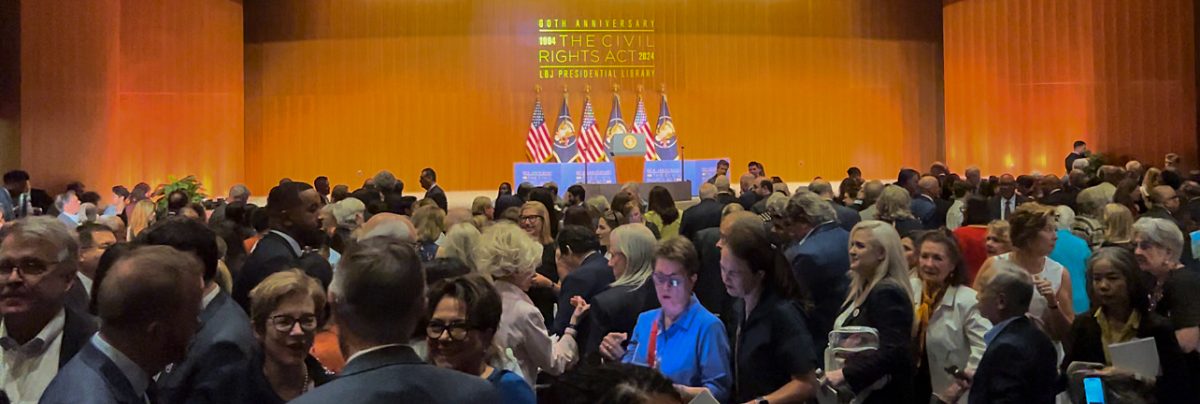
Among the hundreds of guests filling the LBJ Auditorium on Monday was Dr. Kristin Hook, who is running for the 21st Congressional District in Texas, which includes much of south Austin. President Joe Biden’s keynote address was the first time that he spoke publicly since he stepped aside from running in the upcoming election. Guests like Hook were grateful for the opportunity to be at the historical event.
“I think it was fantastic, very well laid out, the music was so moving, the speeches were so moving,” Hook said. “I really appreciated being among the audience to first hear President Biden speak after he stepped down. I thought it was a great event, and it did a great job of commemorating the importance of the Civil Rights Act.”
Biden devoted much of his speech to the message that that while accomplishments like the 1964 Civil Rights Act are in the past, there is still a brighter future to fight for, and vast amounts of progress that is still needed to be made in order for the nation to live up to its founding principle that “all men are created equal.”
“So I’m 40,” Hook said. “Obviously I wasn’t alive during the Civil Rights Act, but all of these videos, speeches and stories that we heard today remind us that we are resting on the shoulders of giants and that it is our turn to take the baton and move forward to make sure that we continue that fight for equal opportunity for everybody. That’s one of the most powerful messages I think that Biden gave today, reminding us that there is a lot of work that we still have to be doing, and we have to make sure that we are showing up to do that.” Photo and caption by Lillian Gray.
View this post on Instagram
Rep. Greg Casar, who represents Texas’s 35th Congressional district, was one of the invited guests at the commemoration of the 1964 Civil Rights Act. Casar, a Democrat who served on Austin’s City Council from 2015-2022, greeted President Joe Biden at the Austin-Bergstrom Airport and then proceeded to the LBJ Presidential Library Auditorium to see his keynote speech. Following the event, Casar shared a statement in support for Biden’s call for a more ethical Supreme Court.
“Today while in Austin, President Biden announced common-sense, necessary reforms to the Supreme Court to protect the civil rights of all Americans,” he said. “With term limits for the justices, an ethics code and a constitutional amendment limiting presidential immunity, we can ensure the Court is balanced and not corrupted by billionaires and extremists.”
He described the President’s proposals as an opportunity to continue to extend Johnson’s work, a sentiment expressed throughout the event.
“These reforms would continue the legacy of President Lyndon Baines Johnson — protecting and advancing civil rights for everyone,” he said. “Americans deserve a Supreme Court that protects the law and our freedoms, rather than dismantling our rights and liberties at the behest of corporations and extremists.”
Caption by Lillian Gray. Photograph from Rep. Casar’s Instagram account, @repcasar.
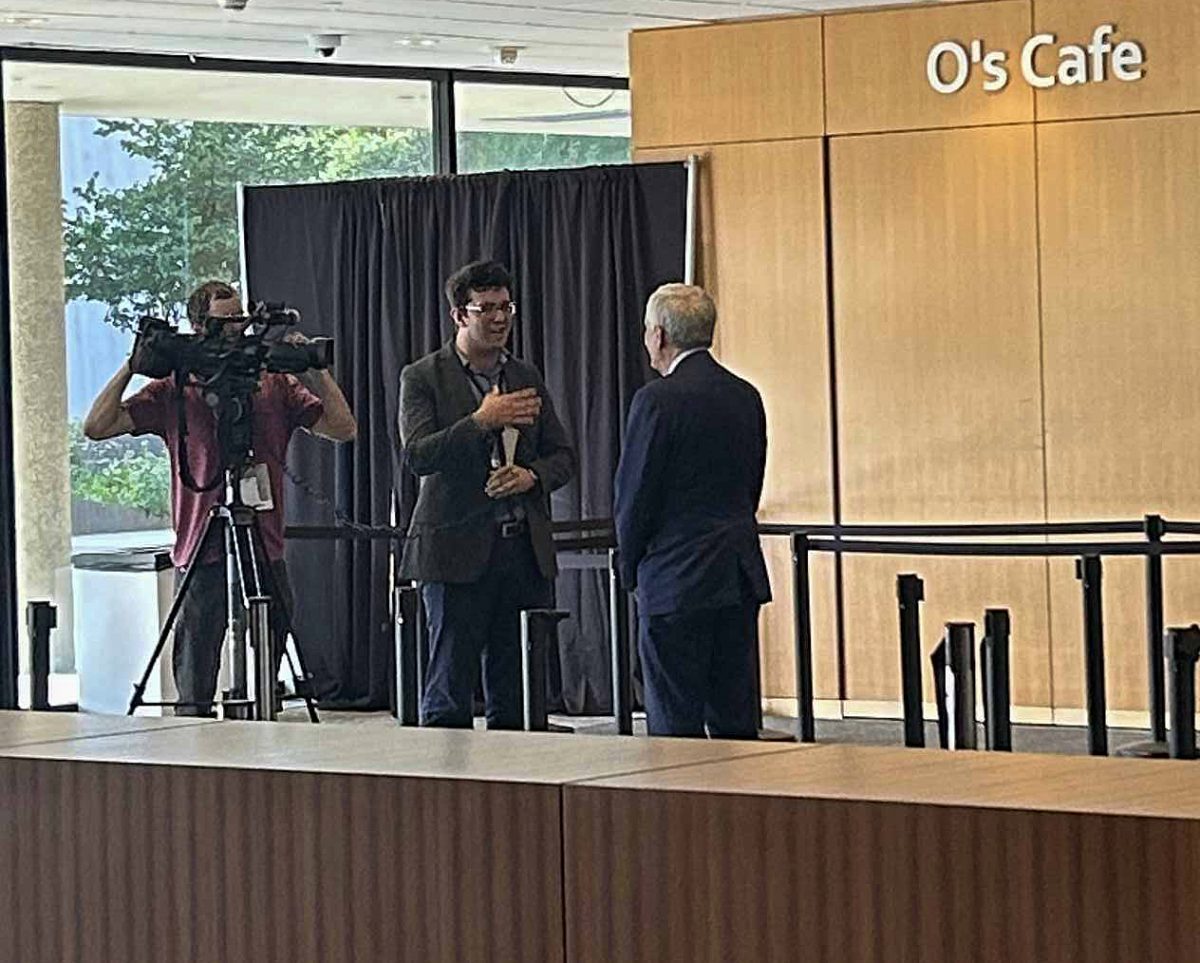
After greeting President Joe Biden at the Austin-Bergstrom Airport, Rep. Lloyd Doggett, D-Texas, made his way to the LBJ Presidential Library to watch Biden’s keynote address at the 60th anniversary of the Civil Rights Act event. In the above image, Doggett grants an interview to one of the many news outlets at the event.
On July 2, Doggett was the first Democratic congressman to publicly call for Biden to step aside from running for a second term in the upcoming presidential race. Doggett called specifically for Biden to follow in the footsteps of 36th president Lyndon B. Johnson who chose not to run for a second term in the 1968 presidential election, allowing more able individuals to take his place. On July 21, Biden officially decided to step out of the race and at Monday’s event, spoke publicly for the first time since that decision.
“I’m really really pleased that President Biden stepped aside and made the sacrifice,” Doggett shared with MacJournalism immediately after the event. “That’s what I told him at the airport, [that he] made the sacrifice that can save our country from Donald Trump.”
Although Biden has stepped out of the race, much of his speech consisted of spelling out future steps that he believes need to be taken. While the burden of pushing that agenda may rest with Vice President Kamala Harris as she begins her presidential campaign, Doggett said that younger Americans must acknowledge the power and the responsibility they have in the upcoming election.
“It’s just a matter of ensuring that everyone who turns 18 registers to vote and then actively participates because those who are turning to vote for the first time have more at stake for those of us who have been around for a while,” he said. “The future of our country in terms of the climate crisis, in terms of women’s health care, in terms of voting rights is in their hands so we need everybody to turn out.” Photo and caption by Lillian Gray.






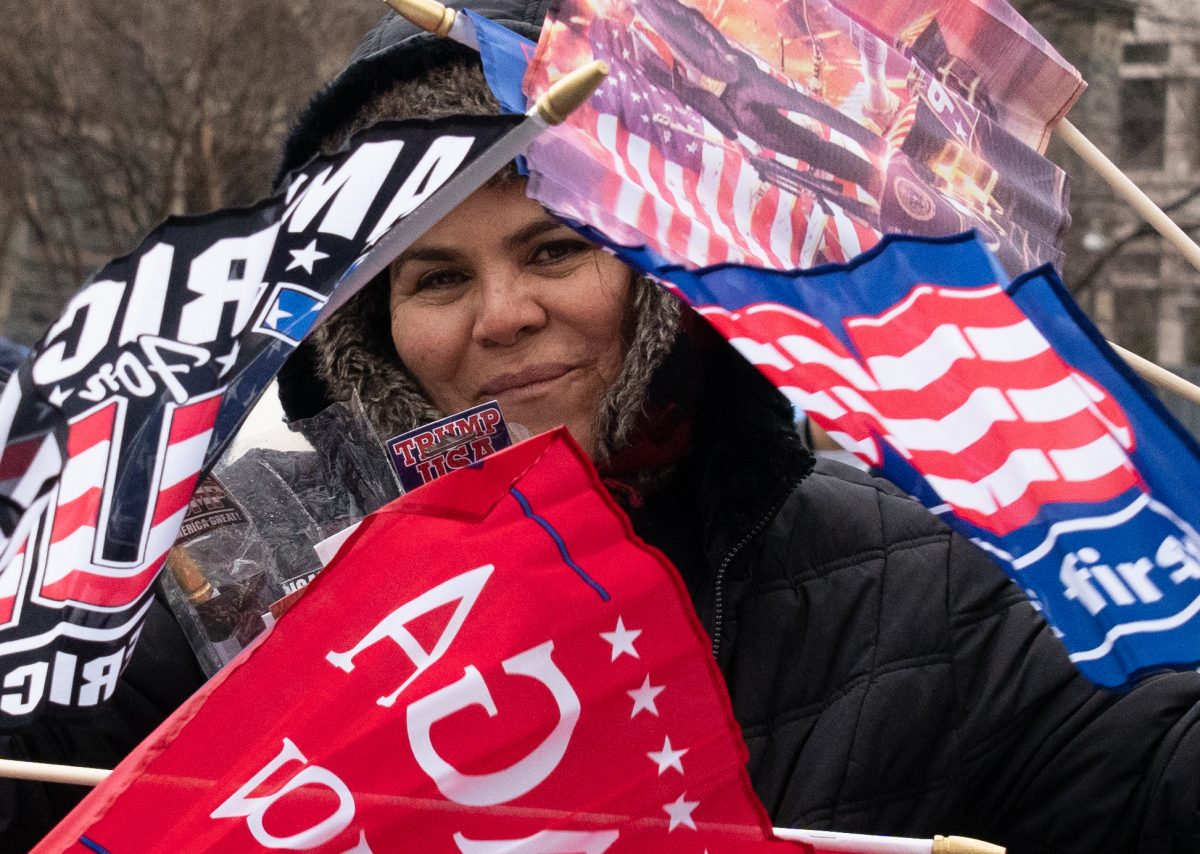

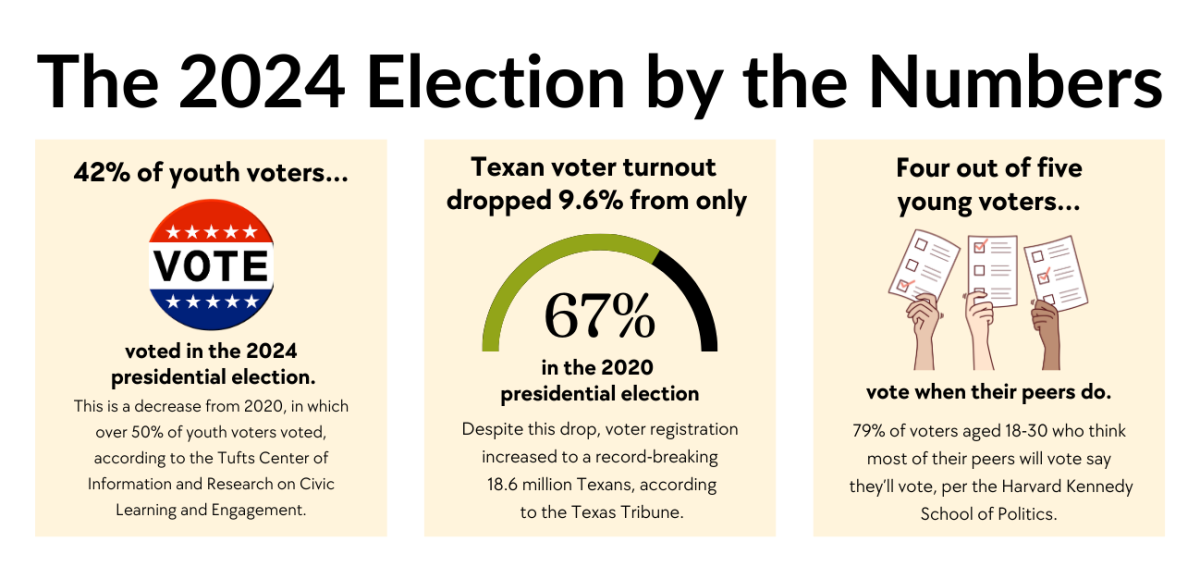
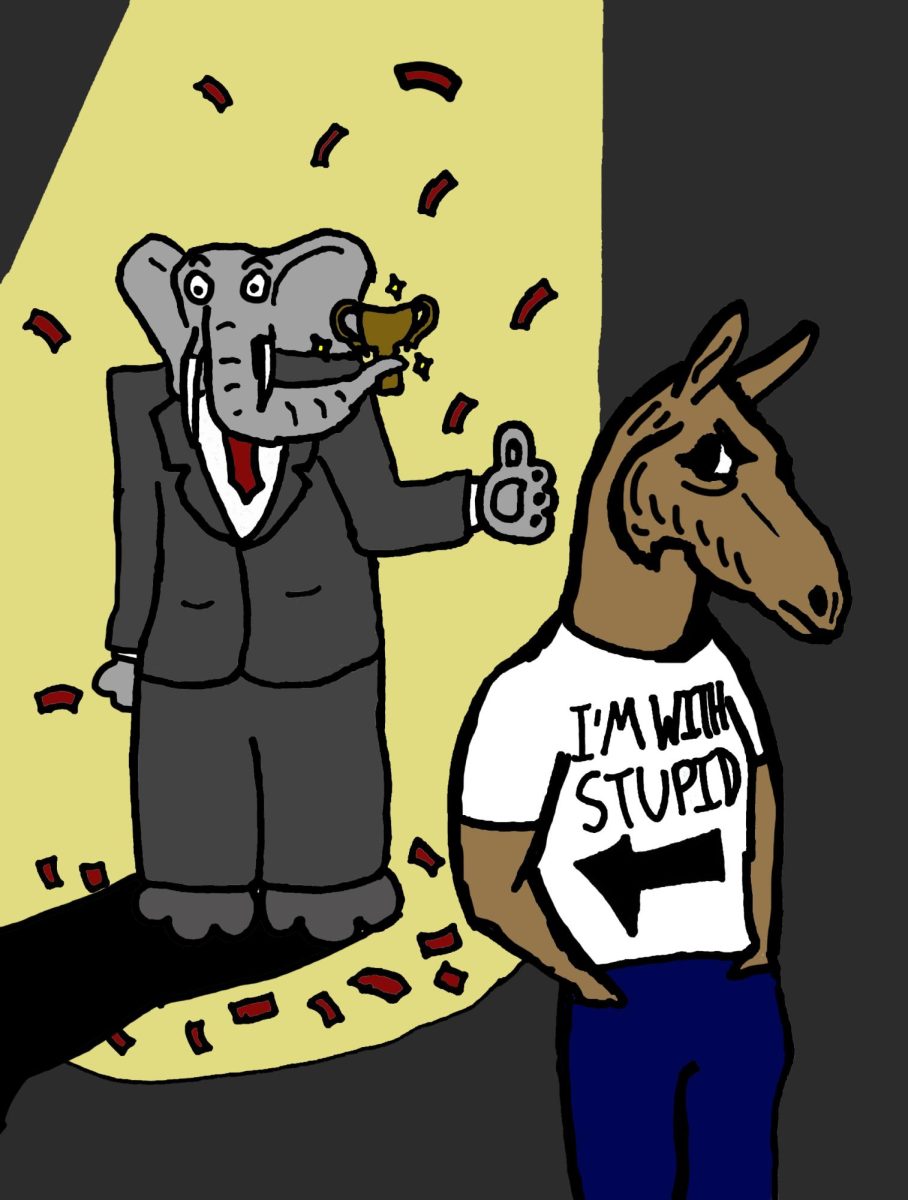
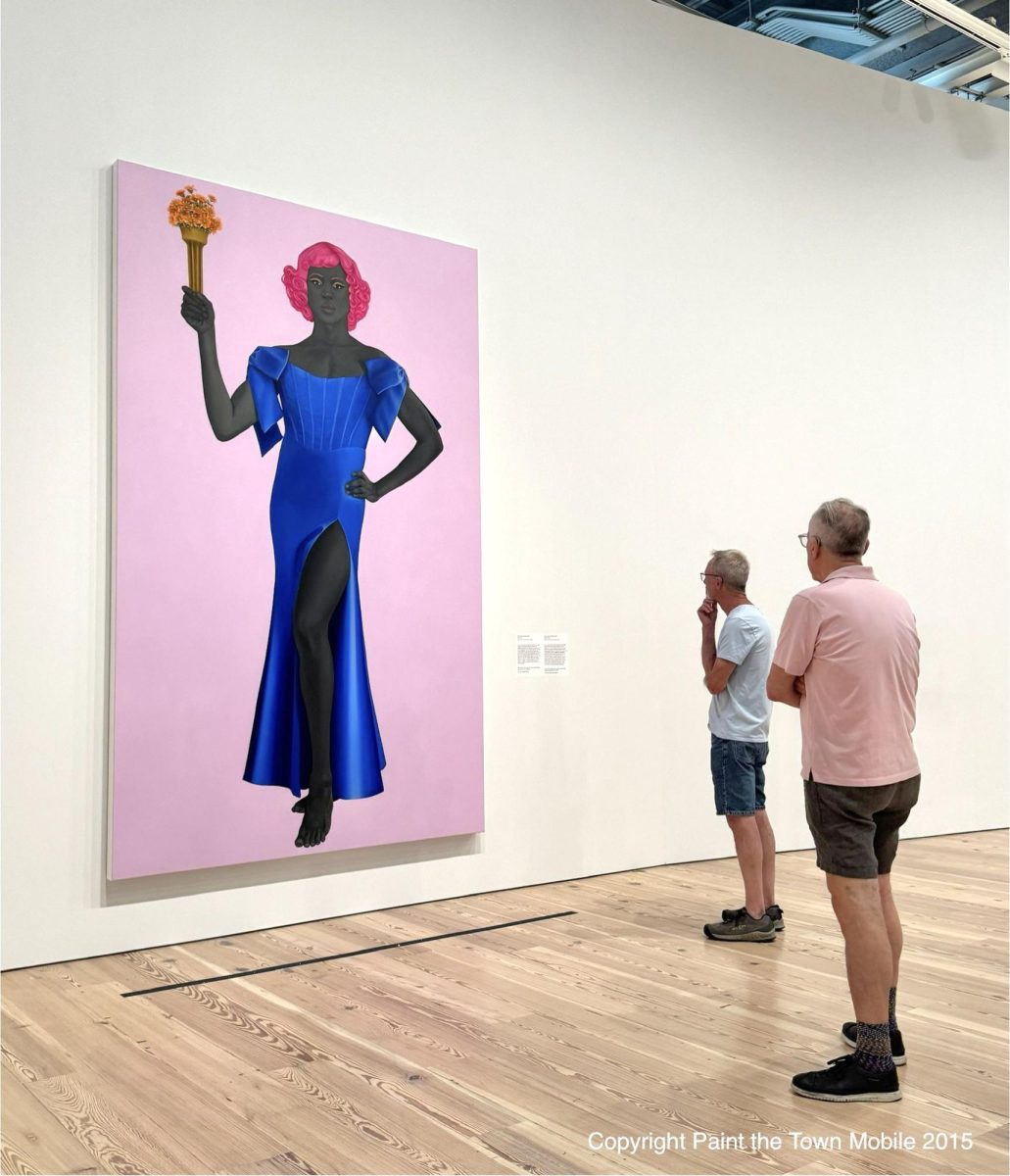
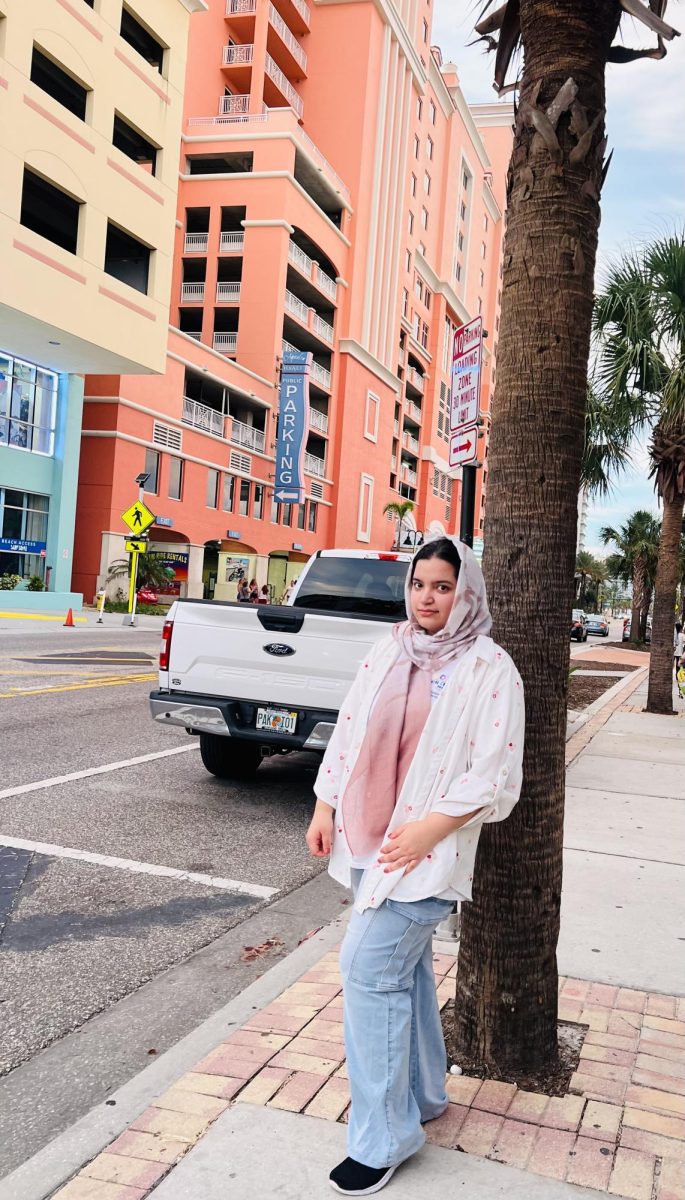
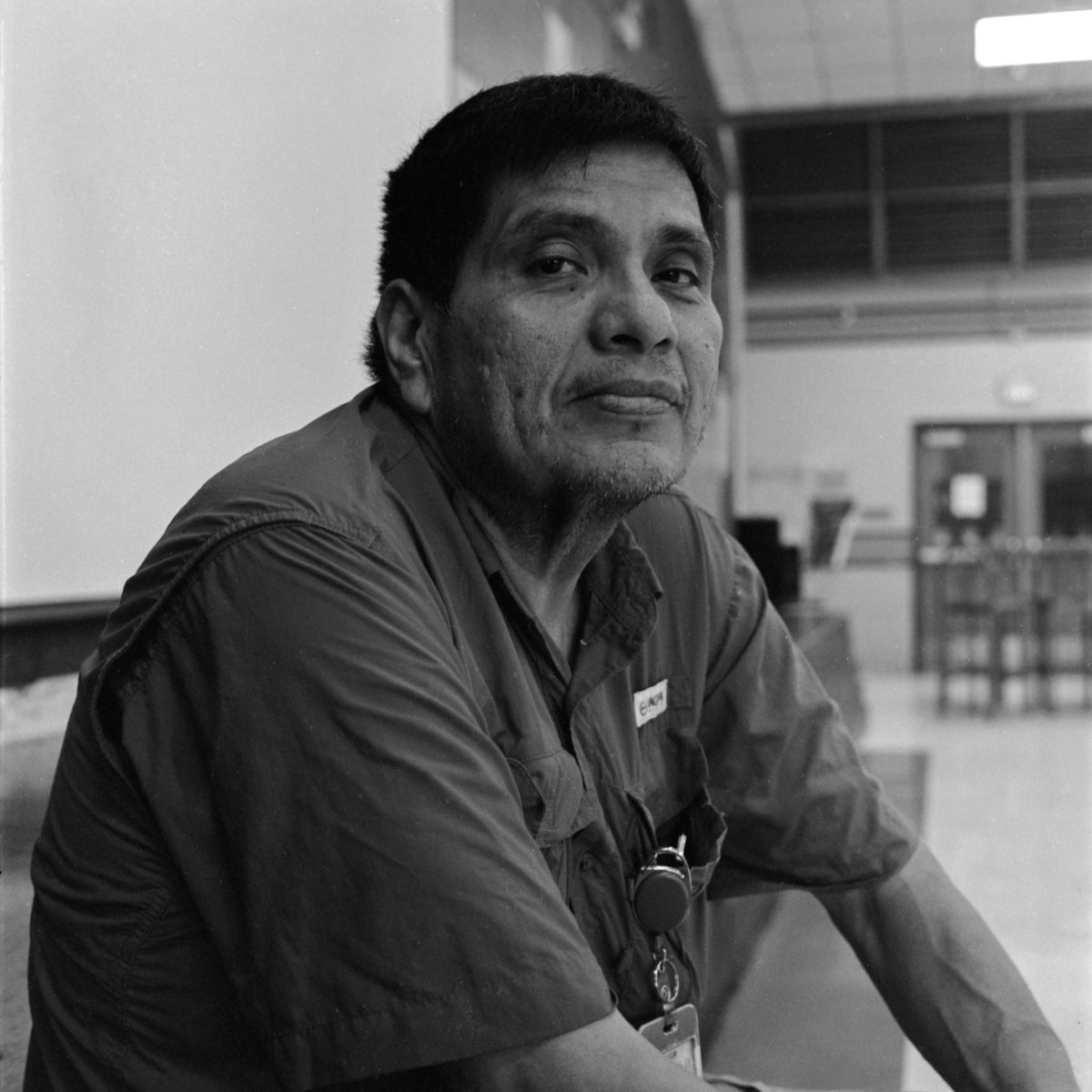
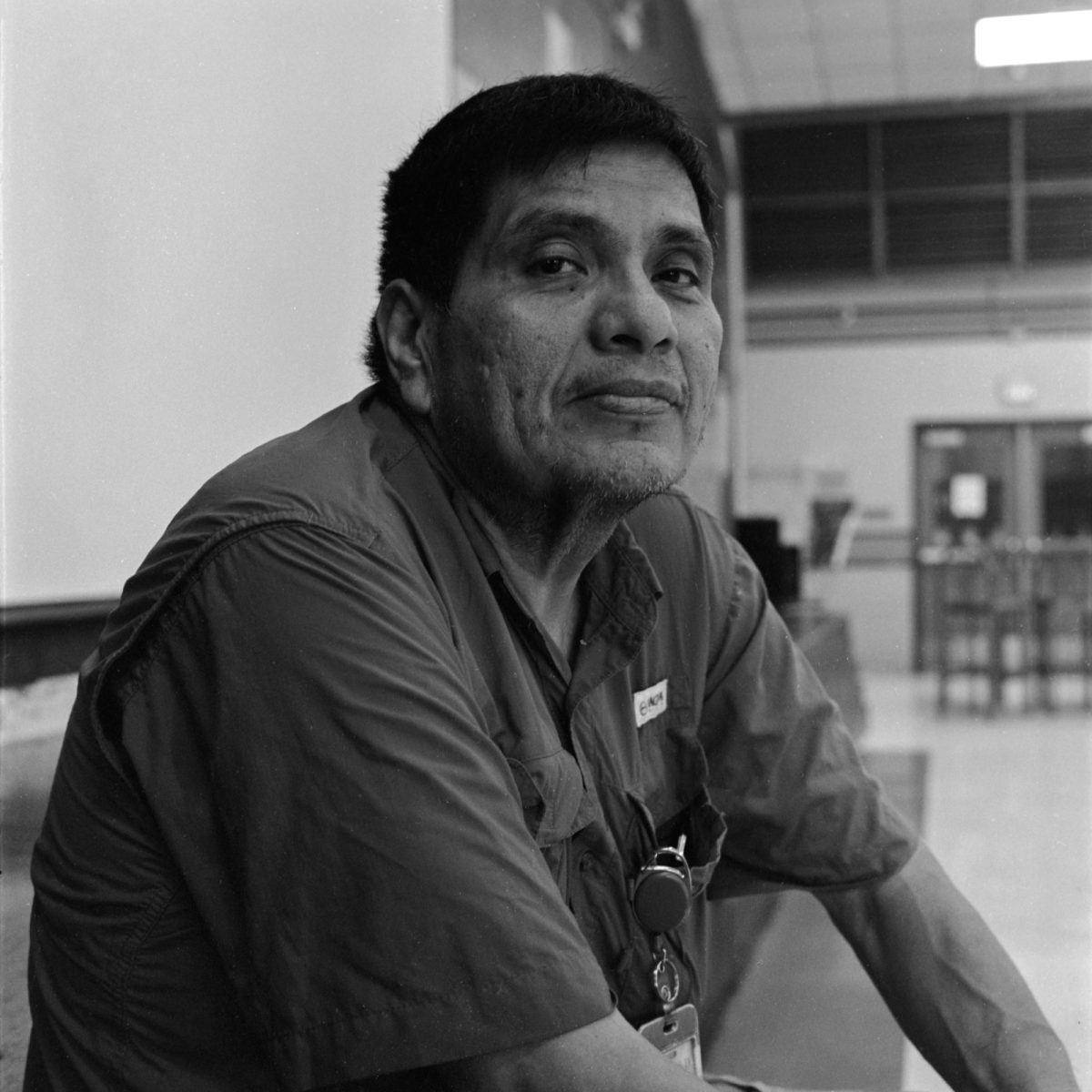
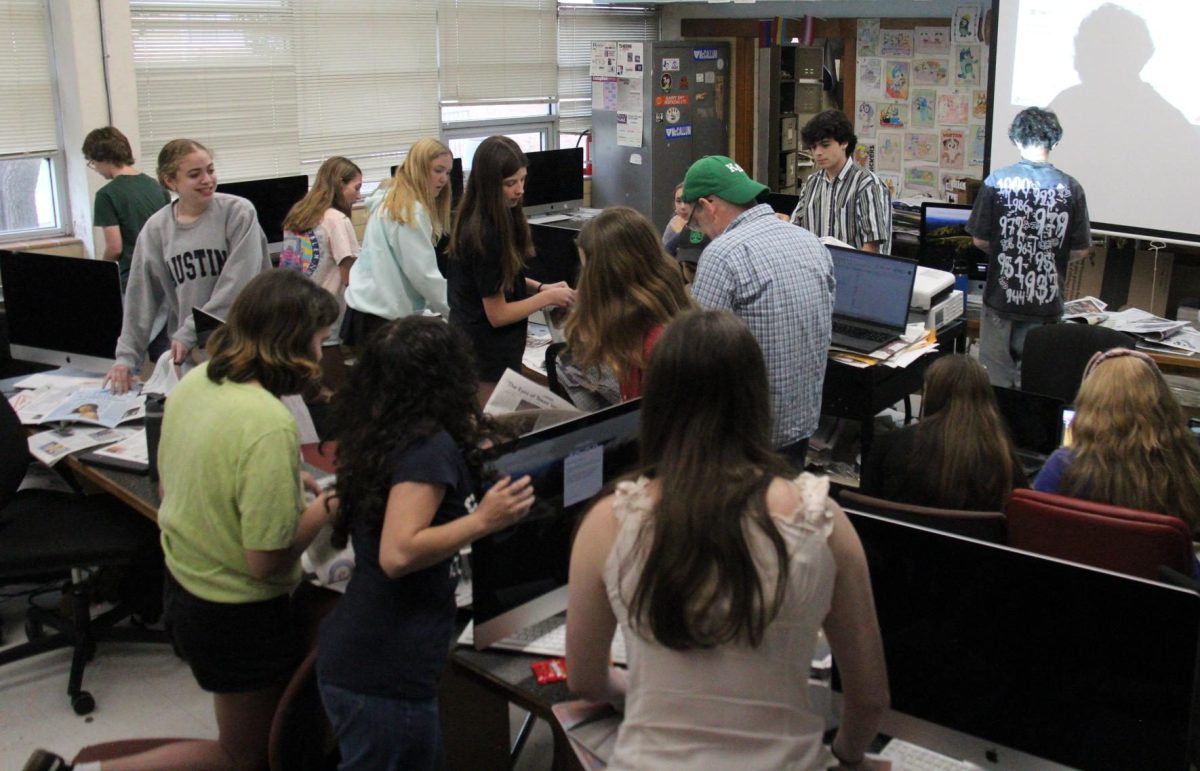






M Gilliland • Aug 5, 2024 at 7:52 pm
Tremendous article, reporting history being made. Way to go!